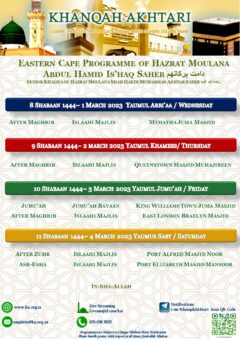The Quran has 35 verses relating to finance and economics. The revelation of the Quran concluded with verse 2:281 warning traders in business and economics. Verse 2:282 is the longest verse in the Quran and it is regarding finance and economics. The most celebrated compendium of Hadith in the Muslim world, Sahih Al Bukhari, contains 113 chapters on finance. 471 Hadith are devoted to finance and economics. Hidayah is a famous manual of jurisprudence. It contains 24 intricate and complex chapters addressing: forward exchange contracts, cash sales, credit sales, spot sales, currency exchange, collateral, partnerships, leasing, endowments, laws of succession and more.
Islam has a wealth of guidelines on best business practice. Being a manual for the complete way of life, Islam takes into account the fact that people would fall into debt at some time or the other. Here are some guidelines on how to avoid debt, and how to extricate oneself from debt. In these trying and volatile economic times, this is extremely pertinent advice.
1. Be serious about paying back
The first step is to be serious about paying your debts back. This will entail knowing who and how much you owe. Make a list of your debts, including the creditor, total amount of the debt, monthly payment, and due date. Having all the debts in front of you will allow you to see the bigger picture and stay aware of your complete debt picture.
Don’t just create your list and forget about it. Refer to your debt list periodically, especially as you pay bills. Update your list every few months as the amount of your debt changes.
The Hadith indicates that if a person takes a loan with the intention of paying it back, he will get the help of Allah Ta’ala in repaying it. The Prophet sallallahu alaihi wa sallam said, “Whoever takes the money of the people with the intention of repaying it, Allah will repay it on his behalf, and whoever takes it in order to spoil it, then Allah will spoil him.” (Bukahri, Hadith 2387)
The hadith extolls the virtue of being determined to pay off ones debts by stating that the best among you are those who repay their debts handsomely. (Bukhari, Hadith 2390)
2. Use a monthly budget to plan your expenses
Keeping a budget helps ensure you have enough money to cover your monthly expenses. Plan far enough in advance and you can take early action if it looks like you won’t have enough money for your bills this month or next. A budget also helps you plan to spend any extra money you have left after expenses are covered. You can use this extra money to pay off debt faster.
The idea of a budget to moderate expenditure is one that is reinforced by the Quranic precept that one of the characteristics of the favoured servants of Allah is that they are those who, when they spend, are neither extravagant nor miserly. (Quran 25:67)
Extravagance in spending is a sure way to financial disaster as outlined in the Quran: “And let not your hand be tied (like a miser) to your neck, nor stretch it forth to its utmost reach (like a spendthrift) so that you become blameworthy and in severe poverty.” (Quran 17:29) Any spending on anything sinful, or overspending on allowed things which are wasteful is extravagance. (Ma’ariful Quran 6:512) Those who waste are termed the brothers of the Devil (Quran 17:27)
The Hadith reinforces the concept of moderation and avoidance of extravagance by advising that when you eat, drink, give charity and wear clothes, let no extravagance or pride be mixed up with what you do. (Ibn Maja, Nasai)
Embrace a simple lifestyle: We believe we need lots of things to survive. In reality we can get by with very little. Life will seem a bit drab but it’s your call: temporary indulgences and sleepless nights with debt, or a few sacrifices now to be free of debt for the rest of your life! As the Hadith states, “The person who sticks to the middle path and moderation in spending will never become a destitute and poor.” (Imam Ahmed, Ibn Kathir)
3. Prioritize payments
Paying off credit card debt first is often the best strategy because credit cards have higher interest rates than other debts. Of all your credit cards, the one with the highest interest rate usually gets priority on repayment because it’s costing the most money. Herein lies the benefit of Islam’s prohibition of an interest based business model.
Use your debt list to prioritize and rank your debts in the order you want to pay them off. You can also choose to pay off the debt with the lowest balance first.
Paying high-interest rate debt first makes sense from a financial standpoint, but that method isn’t best for everyone. Dave Ramsey, millionaire-gone-bankrupt-turned-millionaire, suggests the snowball method of paying off smaller debts first regardless of interest rate. He argues that when small debts are paid off sooner, you remain motivated to pay off the next debt and the next until you’re debt free.
It’s true that the smallest-balance-first method lets you pay off some debts sooner in the beginning. Having an account completely paid off is a great feeling. But remember, it takes you longer to pay off the debt completely under the smallest-debt-first method.
When you’re ready to pay off your debts, you have to decide if you need the motivation from paying off smaller debts at the expense of spending more money on interest. Don’t spend too much time thinking it over; the important thing is that you get started even if it means paying off some debts quickly.
4. Courage
In a hadith in Saheeh At-Tirmidhi it was narrated that a man who was in debt came to Ali ibn Abi Talib radhiallahu anhu seeking his help to pay off some of his due payment. Ali radhiallahu anhu told him: “Shall I not teach you some words [i.e. a dua] which the Prophet sallallahu alaihi wa sallam taught me, if you said it, Allah will take care of your debt even if your debt was as big as a mountain.” Ali radhiallahu anhu then said to the man, “say:
اللَّهُمَّ اكْفِنِي بِحَلاَلِكَ عَنْ حَرَامِكَ وَأَغْنِنِي بِفَضْلِكَ عَمَّنْ سِوَاكَ
O Allah [Allahumma]
Suffice me with that which is lawful against that which is prohibited. [ikfinee bihalalika an haraamik]
and make me independent of all those besides You [Wa aghninee bifadlika am-man siwaak]
Here we are begging Allah Ta’ala to help us pay off our debt using lawful and permissible avenues and not through impermissible resources. And to make us dependent on Allah and no one else.
Reciting this dua while simultaneously working hard to earn lawful income will result in paying off debts. Pondering on the precepts outlined in this dua teaches us two lessons that can aid payment of debt:
1. to steer clear of prohibited avenues of earning, and
2. to take courage in trying to find independent means of income.











COMMENTS